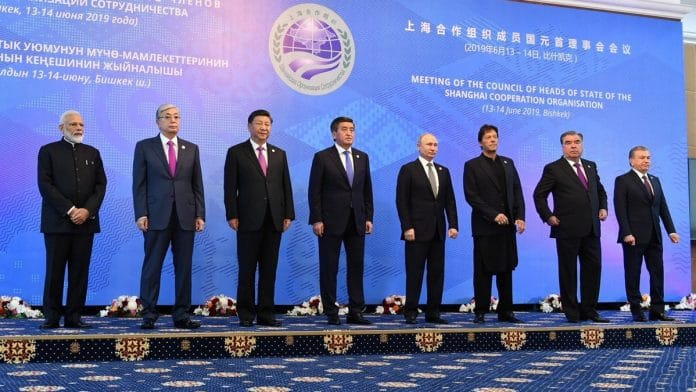New Delhi: Prime Minister Narendra Modi exchanging pleasantries with his Pakistani counterpart Imran Khan in the Kyrgyz capital of Bishkek is anything but thawing of ice between the sparring neighbours.
India has sent a clear signal to Pakistan in Bishkek that “it is neither ready for talks nor is it willing to soften its stance” in the near future unless Pakistan is able to prove that it has indeed stopped sponsoring terror in its country, top Indian sources told ThePrint.
Friday’s brief encounter between the two prime ministers was the first time the two leaders came face-to-face after Khan’s election as Pakistan’s prime minister last year and Modi himself returned to power for a second term last month.
The leaders, the sources said, crossed each other’s paths several times during the Shanghai Cooperation Organisation (SCO) summit meeting. But neither made an effort to break the ice.
The SCO summit took place in the Kyrgyz capital on 13-14 June. Both India and Pakistan are members of the China-led group since 2017.
Also read: Pakistan says will hold talks with India on ‘basis of equality’, up to New Delhi to decide
Earlier, during the SCO foreign ministers’ meetings last month, then external affairs minister Sushma Swaraj was seen having a discussion with Pakistani foreign minister Shah Mahmood Qureshi. However, the Ministry of External Affairs had denied they were having a dialogue as such.
New Delhi is now clear that talks with Islamabad will not bear fruit and hence it is futile to continue the dialogue, the sources said.
“The biggest problem with Pakistan is that terrorism goes unchecked there. They are unable to control the terrorists and their network,” said former Indian High Commissioner to Pakistan Sharat Sabharwal.
“On the other hand, for India the room to manoeuvre with Pakistan is increasingly getting restricted. The stance of ‘terror and talks cannot go together’ has left no margin for us to move ahead,” he said.
India gearing to blacklist Pakistan at FATF
The Indian sources said that New Delhi is now planning to up the ante and produce substantial evidence at the Paris-based Financial Action Task Force (FATF) to get Pakistan blacklisted as that can badly hurt Islamabad.
The FATF plenary meeting is due to take place in Orlando, Florida, from 16 to 21 June. The FATF’s decision-making body, the FATF Plenary, meets three times a year.
India is planning to strongly lobby the meeting to put Pakistan in the blacklist to “paralyse the terror network there”, sources said. India has “enough evidence” to show the international community that Pakistan-based terrorist groups are operating in Jammu and Kashmir, they said.
“While India wants to put Pakistan on the blacklist at the FATF, the international community has no appetite for that,” said Ayesha Siddiqa, research associate at the School of Oriental and African Studies, London, and author of Military Inc.
“India wants Pakistan to wrap up the terror network. Both India and Pakistan are now standing in a maximalist position. The silence between India and Pakistan is going to be longer this time,” Siddiqa said.
Pakistan is presently in the FATF ‘grey list’. During the last plenary meeting, FATF decided to continue keeping Pakistan in the grey list due to its weak systems to fight money-laundering and terror financing.
At that time, the inter-governmental body had also observed that Islamabad had not done enough to curb terrorist groups such as the Islamic State, al-Qaeda, Jamaat-ud-Dawah, Falah-i-Insaniat, Lashkar-e-Taiba, Jaish-e-Mohammed and the Haqqani Network, among others.
Blacklisting Pakistan will not just jeopardise its economy, it might also become difficult for Pakistan to obtain the $6 billion loan from IMF, analysts said.
Pakistan says it is a victim of terror as well and is fighting the problem. It has claimed that since February it has shut down more than 13 terror training camps in Pakistan-occupied Kashmir.
During the SCO summit, PM Khan said Pakistan is an “attractive investment destination” and that it can boast of a “a vast pool of skilled human resource, a large agrarian base, tremendous tourism potential, diverse mineral wealth, and a developed IT infrastructure”.







And what about the terror being perpetrated in the disputed territory of Jammu and Kashmir by the Indian government?
And terror financing by Indian government in Pakistan to various terrorist outfits operating in Baluchistan and Tribal areas.
Hugging heads of states when on visits and displaying discourtesy to the PM of Pakistan at an international meet reflects a very unstatesmanlik uncouth approach/ attitude.
I am sure all the widows of slain souldiers will agree with you.
Watched Ms Jyoti Malhotra’s interview with Vice Chancellor Waheed of Ladakh. So many home truths, delivered with finesse. A very complex issue, the messiest part of partition, reduced to a simplistic, black and white binary. The issue is not getting resolved, nor is it going away. Draining us of resources and vitality.